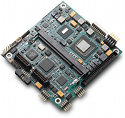SUMIT-ISM module debuts with Atom onboard
Apr 10, 2009 — by LinuxDevices Staff — from the LinuxDevices Archive — 1 views Adlink has announced an SBC (single-board computer) using a SUMIT (stackable unified module interconnect technology) interface and an ISM (industry standard module) form factor. The CoreModule 730 includes an Intel Atom Z5xx processor, gigabit Ethernet, PCI Express, and a CompactFlash socket, the company says.
Adlink has announced an SBC (single-board computer) using a SUMIT (stackable unified module interconnect technology) interface and an ISM (industry standard module) form factor. The CoreModule 730 includes an Intel Atom Z5xx processor, gigabit Ethernet, PCI Express, and a CompactFlash socket, the company says.
(Click here for a larger view of Adlink's CoreModule 730)
Billed as an “Ampro by Adlink” product — Adlink acquired Ampro, originator of the PC/104 format, last year — the CoreModule 730 appears to be the industry's first SUMIT-ISM SBC, which will take a little explaining. SUMIT-ISM, initially dubbed Express104, was devised by the SFF-SIG (Small Form Factor Special Interest Group) last year, and refers to two different things: first, the use of two 52-pin SUMIT expansion connectors, and second, the use of an ISM (industry standard module) form factor.
SUMIT, recently revised to version 1.3, is designed to support legacy low-speed peripherals, up to four USB 2.0 interfaces, and up to six PCI Express lanes. The SUMIT connectors are expected to be featured on a wide variety of form factors and, indeed, have already made their debut on pico-ITXe boards, such as Via's Epia-P710.
ISM, meanwhile, refers to a 3.8 x 3.6 (96 x 90mm) form factor matching that of the venerable PC/104 standard. Defined by the SFF-SIG, like SUMIT itself, ISM employs backward-compatible dimensions, I/O zones, and mounting holes.
Put these ingredients together, and you have SUMIT-ISM, which features a PC/104-compatible board outline, but replaces the old 120-pin PCI-104 connector with the 104-pin SUMIT A/B pair of connectors. If ISA backward compatibility is desired, SUMIT-ISM boards can still include the requisite bridge circuitry and a 104-pin PC/104 connector, too.
Adlink's new CoreModule 730 doesn't bother with ISA, but is said to provide PCI Express, LPC, SPI, I2C, and USB expansion via its SUMIT A/B connectors “in a fraction of the space previously occupied by only the 33MHz parallel PCI-1-4 bus.” A low-cost variant of the module, meanwhile, has only a SUMIT A connector, with a single PCI Express lane.
The CoreModule 730 uses Intel's Atom Z530 (1.6GHz) or Z510 (1.1GHz) CPUs, together with the expected SCH US15W northbridge/southbridge. The module accepts up to 1GB of memory via a single SODIMM slot, and also has a CompactFlash socket. The device supports gigabit Ethernet and either CRT or flat-panel displays, Adlink adds.
Features and specifications listed by Adlink for the CoreModule 730 include:
- Processor — Intel Atom Z530 clocked at 1.6GHz or Atom Z510 clocked at 1.1GHz
- Memory — Up to 1GB of RAM via single SODIMM slot
- Storage — Has onboard CompactFlash socket
- Networking — Gigabit Ethernet
- Other I/O and expansion:
- Enhanced IDE
- 7 x USB 2.0 (3 via SUMIT connectors)
- 8 GPIOs
- PCI Express
- LPC
- SPI
- 12C
- CRT and LVDS video, with dual-display support
- Enhanced IDE
- Operating temperature — -20 to 70 deg. C (-4 to 158 deg. F)
- Dimensions — 3.8 x 3.6 inches (96 x 90mm)
- Power requirements — tbd
Colin McCracken, product director for Adlink's embedded computer division, said “The CoreModule 730 is a true single-board solution, ready to run with simple cables. By departing from space-inefficient pin-in-socket expansion with parallel buses, the CoreModule 730 will bring stackable SBCs into new application areas.”
Availability
Adlink did not cite operating system support for the CoreModule 730 but, given its standard Intel chipset, the device likely supports Linux, Windows XP, Windows XP Embedded, Windows CE, and other OSes. Priced at “around $400 in OEM quantities,” the SBC will be sampling next month, the company says.
Further information may be found on the Adlink website, here.
This article was originally published on LinuxDevices.com and has been donated to the open source community by QuinStreet Inc. Please visit LinuxToday.com for up-to-date news and articles about Linux and open source.